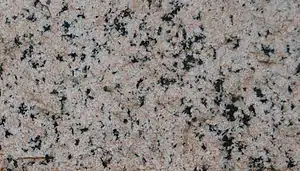Milford pink granite
Milford pink granite, also known as Milford granite or Milford pink is a Proterozoic igneous rock located in and around the town of Milford, Massachusetts, covering an area of approximately 39 square miles (100 km2), as mapped by the USGS.
| Igneous rock | |
 | |
| Composition | |
|---|---|
| Silicon dioxide, Aluminium oxide, Iron(III) oxide, Manganese(II) oxide, Calcium oxide, Magnesium oxide, Potassium oxide, Sodium oxide, Biotite[1] |
From 1870 to 1940, the town of Milford became famous for the "pink" variety of this stone, prized as a building material. According to local legend, the granite was "discovered" in the early 1870s by two brothers, James and William Sherman at Rocky Woods in Milford.[2] At its peak, over 1,000 men labored in dozens of quarries in Milford and nearby Hopkinton. A sample of Milford Pink is on display at the Smithsonian Institution.[3]
Milford pink granite is quarried by the Fletcher Granite Company, at their Lumber Street quarry in Hopkinton.[4]
Description
The granite is described as a light gray or light pinkish-gray to a medium, slightly pinkish or pinkish and greenish-gray biotite granite with spots from 0.2 to 0.5 inches (5.1 to 12.7 mm) across and in some cases tapering out to 1 inch (25 mm) in length.[1] The biotite is typically in clots or short streaks. It is commonly locally gneissic.[5] The color of the stone is governed mainly by its feldspars, pink from the potash and green from the soda lime feldspar.[1]
Examples of use



- Massachusetts
- Bancroft Memorial Library, Hopedale (1898)
- Boston Public Library, McKim Building, Boston (1895)
- Flour and Grain Exchange Building, Boston (1892)
- Memorial Hall, Milford (1884)
- Worcester City Hall, Worcester (1898)[7]
- New York City
- Brooklyn Museum, Brooklyn (1895)[8]
- General Post Office Building (1912)
- Pennsylvania Station (1910)[9]
- Washington, D.C.
- First Division Monument (1924)[10]
- Zero Milestone (1923)[11]
- Other
- Singapore Changi Airport, Changi, Singapore (2002)
See also
References
- T. Nelson Dale (1923). "The Commercial Granites of New England" (PDF). United States Geological Survey. Retrieved August 22, 2017.
- Blackstone River Valley Archived 2008-09-07 at the Wayback Machine
- USGS Milford Granite
- Hopedale Town Hall
- Milford Daily News, May 31, 2008
- "Milford Pink Granite". City University of New York. Retrieved June 2, 2017.
- Work on the Future of Pennsylvania Station Unearths a Bit of Its Past, The New York Times, November 8, 1998.
- "Milford Pink granite". Museum of Fine Arts, Boston. Retrieved August 22, 2017.
- Bragg, Ernest A (1958). History Of Braggville Section of Holliston, Medway and Milford. Boston. p. 13. OCLC 6115177. Retrieved 3 Jul 2015.